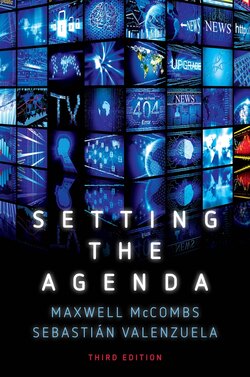Читать книгу Setting the Agenda - Maxwell McCombs - Страница 9
Notes
Оглавление1 Alan Cowell, ‘New owner struggles at a London tabloid’, New York Times, 26 February 2001, p. C15. 2 Max Frankel, The Times of My Life and My Life with The Times (New York: Random House, 1999), pp. 414–15. 3 Theodore White, The Making of the President, 1972 (New York: Bantam, 1973), p. 327. 4 Maxwell McCombs and Donald Shaw, ‘The agenda-setting function of mass media’, Public Opinion Quarterly, 36 (1972): 176–87. The early history of this study offers a salutary note about new theoretical perspectives. A few months after the 1968 election, McCombs and Shaw submitted the paper later published in Public Opinion Quarterly to the annual convention of the Association for Education in Journalism. Their paper was summarily rejected, which explains the four-year gap between the election and the 1972 article. 5 Contrary to a published statement that the phrase ‘agenda setting’ was suggested by an anonymous reviewer of the original article published in the summer 1972 issue of Public Opinion Quarterly, Part I of the McCombs and Shaw report to the National Association of Broadcasters in June 1969 was titled ‘The agenda-setting function of the mass media’. The title of the full report was ‘Acquiring Political Information’. A revised version of this draft report was not submitted to Public Opinion Quarterly until several years later. The full statement about the phrase ‘agenda setting’ originating with an anonymous reviewer is in Robert L. Stevenson, Rainer Böhme, and Nico Nikel, ‘The TV agenda-setting influence on campaign 2000’, Egyptian Journal of Public Opinion Research, 2, 1 (2001), p. 29. 6 Maxwell McCombs and Jian-Hua Zhu, ‘Capacity, diversity, and volatility of the public agenda: trends from 1954 to 1994’, Public Opinion Quarterly, 59 (1995): 495–525; Jill A. Edy and Patrick C. Meirick, ‘The fragmenting public agenda: capacity, diversity, and volatility in responses to the “most important problem” question’, Public Opinion Quarterly, 82 (2018): 661–85. 7 My thanks to John Pavlik for this metaphoric comparison, made during a conversation about the first edition of this book on 12 September 2003 in Bonn, Germany. 8 David Weaver, who came to the University of North Carolina to study for his PhD shortly after the original Chapel Hill study, quickly gained a major role in the development of agenda-setting theory. His contribution as a graduate student during the 1972 US presidential election is detailed in Chapter 6 and as a faculty member at Indiana University during the 1976 US presidential election in Chapter 1. Many other contributions from Indiana University in the subsequent years are noted in other chapters, along with continuing contributions from the University of North Carolina at Chapel Hill. 9 Michael Gurevitch and Jay Blumler, ‘Political communication systems and democratic values’, in Democracy and the Mass Media, ed. Judith Lichtenberg (Cambridge: Cambridge University Press, 1990), pp. 269–89.10 Tom Bettag, ‘What’s news? Evolving definitions of news’, Harvard International Journal of Press/Politics, 5, 3 (2000): 105.11 Davis Merritt and Maxwell McCombs, The Two W’s of Journalism: The Why and What of Public Affairs Reporting (Mahwah, NJ: Lawrence Erlbaum, 2003).
